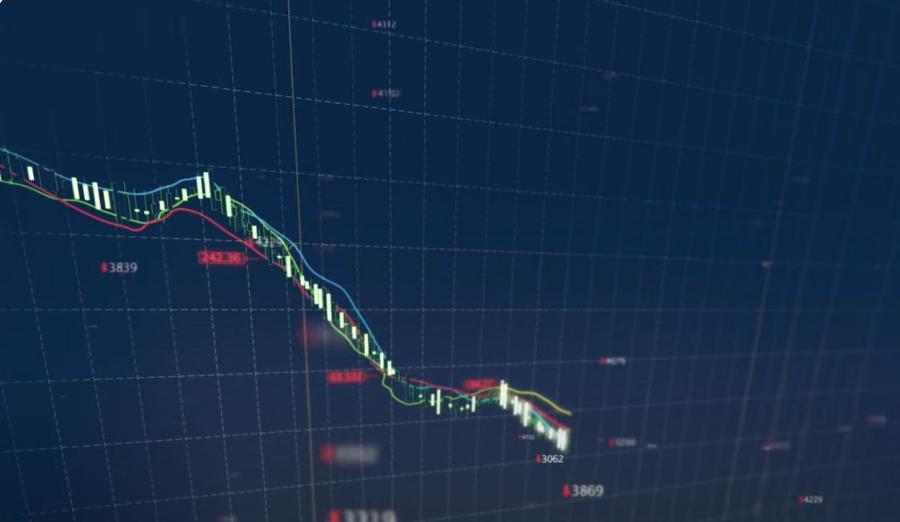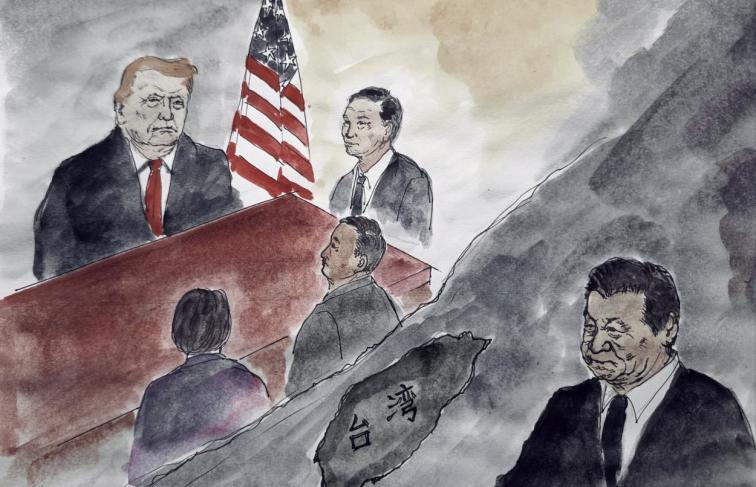Illustrative image: The Chinese stock market is in despair, and Chinese investors are trembling from their losses! (Video screenshot)
[People News] During the 'May Day' Golden Week holiday, major state media outlets of the CCP released a flurry of tourism data in an effort to portray a picture of 'lively prosperity' in consumer spending. However, the actual economic conditions are hard to hide. It has been a month since the escalation of the China-U.S. trade war, and the Chinese economy is grappling with multiple pressures, including declining foreign trade, sluggish manufacturing, tight employment, and weak consumer demand. The disparity between official narratives and public sentiment is growing increasingly pronounced.
As reported by Radio Free Asia, Chen Xiaoqin, the head of a foreign trade company in Shenzhen, shared in an interview that the significant increase in U.S. import tariffs on Chinese goods has rendered many related businesses unable to function normally. She stated, 'In the past, American importers needed orders for electronic products in spring, which were already booked until July. Now these orders have gone to Vietnam. Even if we receive orders now, we have to transfer them to factories in Vietnam. Many production lines in Guangdong have halted. What can we do? We are now waiting for negotiations between China and the U.S. She also mentioned that the company's owner is seeking buyers: 'They are in discussions, and the owner does not plan to continue trading.'
Fang Zhiye, a leader of an enterprise in Wenzhou, Zhejiang, noted that the southern foreign trade-oriented economies are the most affected: 'The foreign trade economies of Guangdong and Fujian are particularly hard hit, with factories closing and markets shutting down, creating a very desolate atmosphere. If an agreement can be reached soon between China and the United States, that would be a positive development. Southeast Asian countries like Vietnam cannot temporarily replace Chinese manufacturing, and if this situation persists in the long term, the industrial chain will inevitably shift out of China, and once it moves out, it won't return.'
Statistics show that airlines have experienced a general decrease of about 30% in air cargo volume. The Port of Los Angeles estimates that starting from the week of May 4, the volume of goods arriving will be one-third less than the same period last year, with over 250,000 containers expected to be cancelled in May.
Official Data Reveals that the Youth Unemployment Rate has Soared to 16.5%
According to official figures, the national urban survey unemployment rate in China was 5.2% in March, but the youth unemployment rate reached 16.5%. Several interviewees reported that the job market remains sluggish, and during the May Day holiday, there was not only a lack of a 'recruitment boom,' but also a significant number of job postings being temporarily withdrawn.
On social media platforms like Weibo, Xiaohongshu, and Douyin, many young people have voiced their struggles with employment. A female student (netizen: Suisui Nian) shared: 'I am a liberal arts master's student graduating in 2025. From last year's autumn recruitment to this year's spring recruitment, up until around April, I still haven't found a job. I've submitted about 8,000 resumes and attended recruitment fairs during the autumn recruitment... but I still can't find a job after graduation.'
Li Fanglin, a migrant worker from Nanchong, Sichuan, told our station: "There are many unemployed people here, and it is currently very difficult to find a job, as there are no positions available. For men over 50, finding work is particularly challenging; it is really hard to secure employment."
Goldman Sachs recently published a report stating that if the United States continues to impose a 145% tariff, around 10 million to 20 million jobs in China could be at risk, which represents about 3% of the national workforce.
Mr. Zhu, an online businessman from Jiangsu, also commented: "Business is tough right now; there is essentially no business at all. Recently, while travelling by train, I heard complaints everywhere, with people cursing the Communist Party during conversations. This reflects the frustration of people who are struggling to make money and are aware of government corruption. Everyone knows that the anti-corruption efforts are targeting disobedient officials."
The Communist Party has Quietly "Exempted" Certain American products
In an effort to prevent business closures and stabilise the industrial chain, the Communist government has implemented remedial measures. According to reports from Bloomberg and Reuters, since April, the Communist Party has issued notifications to companies in a non-public manner, allowing for the exemption or deferral of tariffs on specific American products. These include essential materials such as medical supplies, ethane, semiconductor equipment, and industrial chemicals, with an estimated total value of about $40 billion, which accounts for nearly a quarter of total imports from the U.S. in 2024.
Some analysts believe that this move by Beijing aims to reduce the collateral damage to domestic companies, prevent disruptions in the production chain, rising inflation, or industrial relocation. However, the lack of public disclosure regarding these policies suggests that the authorities are still trying to strike a balance between maintaining a tough stance externally and ensuring internal stability.
May Day Travel Sees 'Crowds of People' as the Public Questions the Narrative of Consumption Recovery
According to Xinhua News Agency, the number of domestic travellers during the May Day holiday reached 295 million, marking a year-on-year increase of 28.2%. Tourism revenue amounted to 166.8 billion yuan, returning to levels seen in the same period of 2019.
However, netizens on platforms like Weibo and Xiaohongshu have raised widespread doubts about the accuracy of these figures. For example, the incident involving tourists stranded at Tianmen Mountain in Zhangjiajie, Hunan, has attracted significant attention. Several tourists reported online that it took over 8 hours to queue down the mountain, with thousands remaining stranded at the summit late at night, calling for refunds. The Zhangjiajie Bureau of Culture and Tourism stated that this was a 'sudden congestion' but did not address concerns regarding inflated ticket prices and inadequate shuttle services.
Moreover, the Baidu Index indicates a notable increase in the search popularity of 'green skin trains' during the May Day period. Many travellers have opted for these cheaper but time-consuming trains due to rising high-speed rail ticket prices. The reality for low- to middle-income groups—having 'time off but no budget'—stands in stark contrast to reports of 'booming consumption.'
The Government is Ramping up Fiscal Stimulus, yet Public Confidence Remains Low
Simultaneously, state media continues to promote the economic data from the May Day holiday vigorously. Xinhua News Agency cites platforms such as Meituan, Tuniu, and Tongcheng Travel, stating that the interest in 'travel during the May Day holiday' has surged, with significant increases in both booking numbers and search volumes. The '2025 May Day Tourism Trend Insight Report' even suggests that tourism popularity may reach its peak in nearly three years.
However, Ms. Zhang (Zhang Nüshi), a resident of Wuhan, candidly expressed that this year's May Day atmosphere is significantly lacking compared to previous years: "I visited our local Walmart yesterday and noticed there weren't many people. The once vibrant Wangfujing area (on Zhongshan Avenue) has emptied out, and there are hardly any shoppers... The atmosphere is certainly not as lively as it used to be; prices have risen across the board, and even the cost of medicine has gone up."











News magazine bootstrap themes!
I like this themes, fast loading and look profesional
Thank you Carlos!
You're welcome!
Please support me with give positive rating!
Yes Sure!